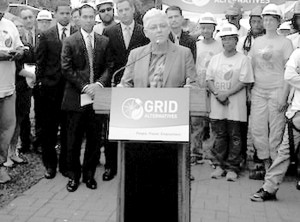Study: Blacks, Hispanics disproportionately affected by CO2 regulation
29th June 2015 · 0 Comments
(Special to the NNPA from The Washington Informer) – The National Black Chamber of Commerce released a study Thursday on the threat of Environmental Protection Agency regulations to low-income groups and minorities that found that the EPA’s “Clean Power Plan” will inflict severe and disproportionate economic burdens on poor families, especially minorities.
The rule will impose the most harm on residents of seven states with the highest concentrations of Blacks and Hispanics, according to the study.
“The EPA’s carbon dioxide regulation is a slap in the face to poor and minority families,” said NBCC President and CEO Harry Alford. “These communities already suffer from higher unemployment and poverty rates compared to the rest of the country, yet EPA’s regressive energy tax threatens to push minorities and low-income Americans even further into poverty.”
The study, authored by Dr. Roger Bezdek, president of Management Information Services, Inc., found that:
• EPA’s rule increases Black poverty by 23 percent and Hispanic poverty by 26 percent;
• In 2035, job losses total seven million for Blacks and nearly 12 million for Hispanics;
• In 2035, Black and Hispanic median household income will be $455 and $515 less, respectively;
• Compared to whites, Blacks and Hispanics spend 20 percent and 90 percent more of their income on food, 10 percent and five percent more on housing, 40 percent more on clothing, and 50 percent and 10 percent more on utilities, respectively;
• The rule will especially harm residents of seven states with the highest concentrations of Blacks and Hispanics: Arizona, California, Florida, Georgia, Illinois, New York and Texas;
• EPA’s rule harms minorities’ health by forcing tradeoffs between housing, food, and energy. Inability to pay energy bills is second only to inability to pay rent as the leading cause of homelessness.
“EPA’s apparent indifference to the plight of low-income and minority households is inexcusable,” Alford said. “We should pursue policies that expand opportunity for the less fortunate, not ones that further disadvantage them. The only solution is for EPA to withdraw its rule.”
This article originally published in the June 29, 2015 print edition of The Louisiana Weekly newspaper.9




